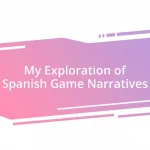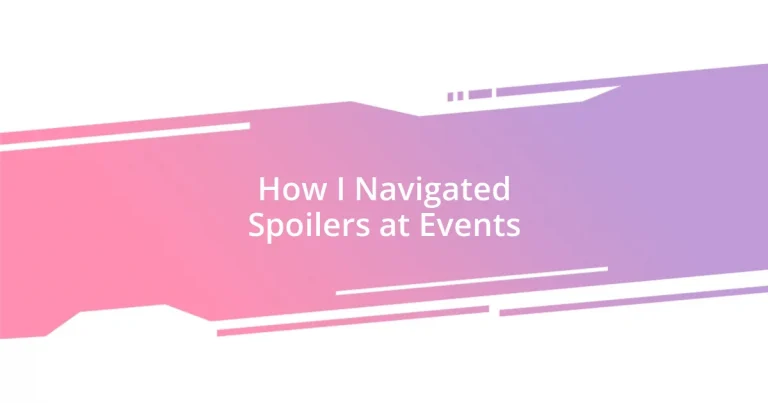Key takeaways:
- Spoilers can diminish the excitement of anticipated events and affect connections with others, prompting the need for strategies to discuss content without ruining surprises.
- Establishing boundaries and communication with friends about spoiler-free zones enhances shared experiences, fostering a collaborative environment to enjoy content together.
- Post-event discussions enrich understanding and connections, with open-ended questions and emotional sharing enhancing the overall experience without veering into spoilers.
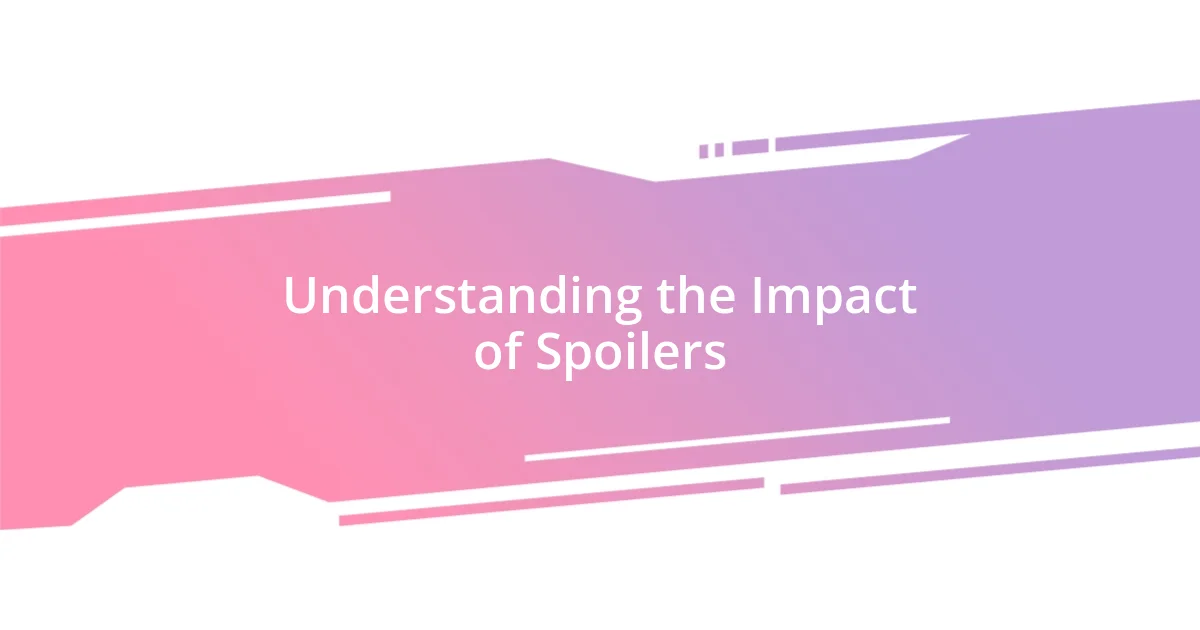
Understanding the Impact of Spoilers
Spoilers can turn the excitement of an anticipated event into a feeling of dread. I remember the time I accidentally stumbled upon a major plot twist for my favorite series right before a big finale event. It left me feeling a mix of frustration and sadness, as I realized that what should’ve been a thrill turned into a predictable experience. Isn’t it amazing how much power that single piece of information can hold over our enjoyment?
The emotional impact of spoilers isn’t just limited to the loss of surprise; it can also affect our connection with others who share our interests. I’ve had friends who chose not to engage in discussions about a movie because they were worried about getting spoiled. It made me ponder: how many moments of shared joy are lost due to the fear of spoilers? This makes me wonder if we, as a community, should find better ways to discuss our favorite content without ruining it for each other.
Moreover, spoilers can influence how we interact with the content itself. I often find myself watching shows differently when I know what’s going to happen. Instead of eagerly waiting for twists, I focus on the details or performances, which can be both a blessing and a curse. It shifts the experience completely—have you ever felt that shift between anticipation and analysis? It’s a strange dance we navigate between wanting to manage expectations while still craving that rush of surprise.
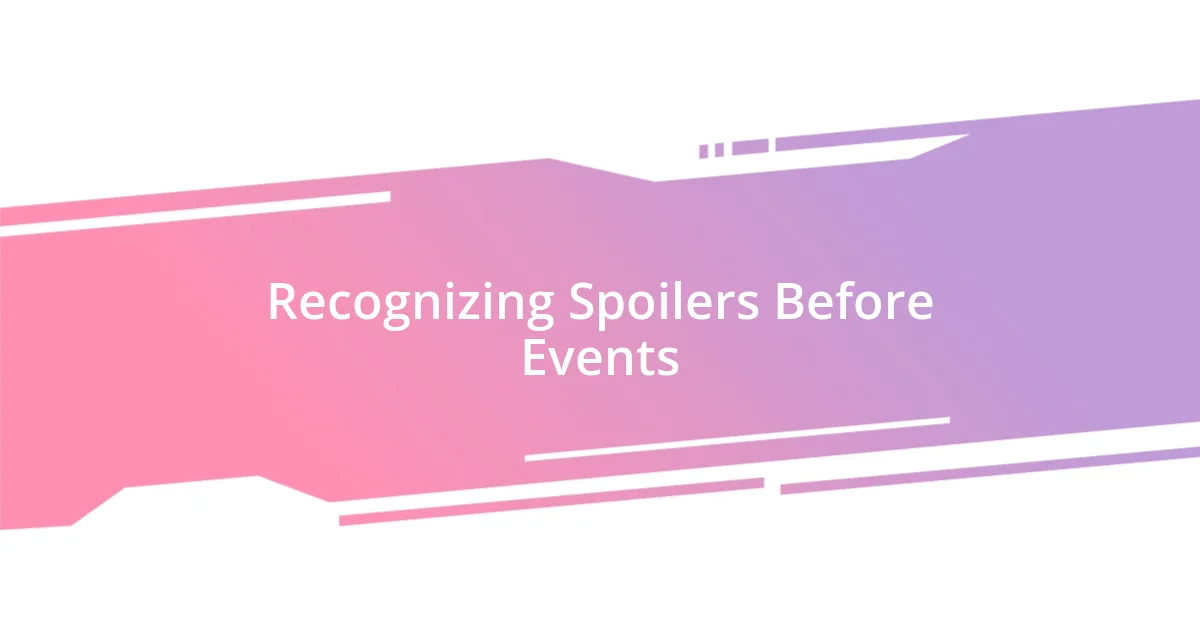
Recognizing Spoilers Before Events
Recognizing spoilers before events is crucial for maintaining the thrill of anticipation. I recall attending a film convention where discussions buzzed around upcoming movies, and I had to tread carefully. One slip and I could ruin the surprise for myself. It made me realize that being aware of the environment and the conversations around me can help safeguard my excitement. Have you ever felt the need to shield your ears during eager conversations to avoid spoilers?
Moreover, scanning social media for hints or rumors can feel like navigating through a minefield. I often catch myself scrolling cautiously, especially in the days leading up to a big event. Keeping an eye on the language used in posts is key—certain phrases can hint at spoilers without obvious intention. It’s like developing a sixth sense for language; you become adept at identifying what to avoid. Ever had that moment where you instantly recognize a comment that might spoil the fun?
Lastly, making a preemptive strategy can be a game-changer. I’ve found that informing my friends about my spoiler-free zone helps establish boundaries. When we set rules around discussions, it turns the experience into a collaborative game where everyone is on the same page. Have you considered how a simple conversation can create a protective bubble for your shared interests?
| Recognizing Spoilers | Strategies to Avoid Them |
|---|---|
| Awareness of Conversations | Set Boundaries with Friends |
| Social Media Vigilance | Develop Language Sensitivity |
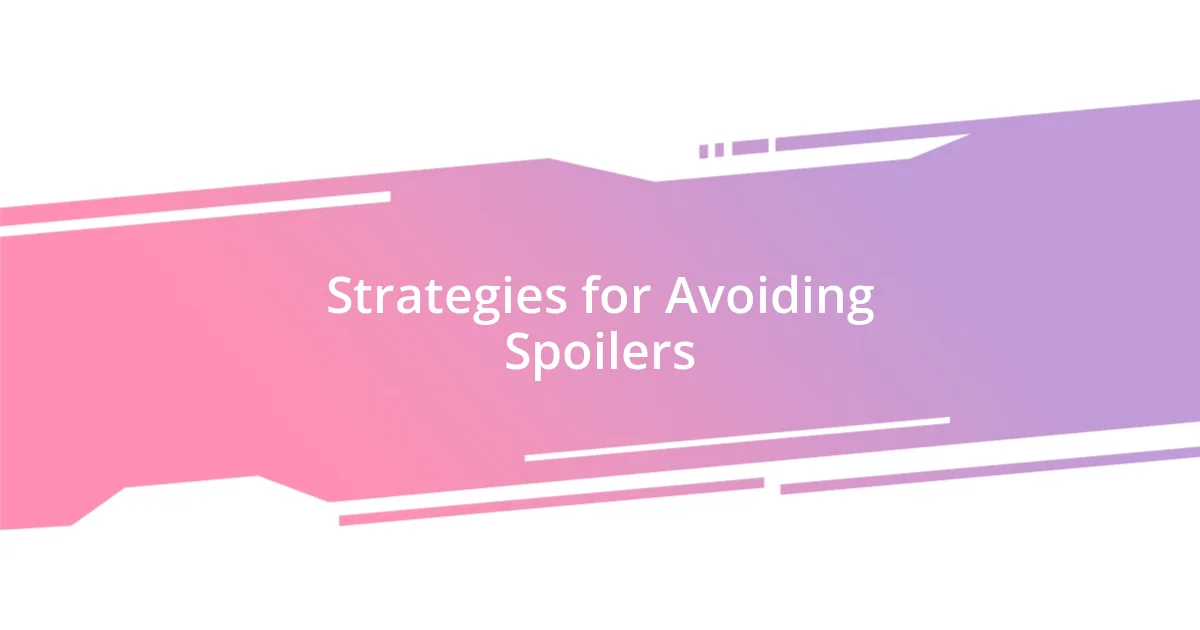
Strategies for Avoiding Spoilers
When aiming to avoid spoilers, I’ve adopted a multifaceted approach that has genuinely helped me preserve the magic of anticipation. I’ve learned that being proactive about my surroundings is key. A memorable instance was when I attended a comic convention, and a friend innocently mentioned a popular show while we were in line for a panel. I had to quickly intervene, politely asking them to save the discussion until after the event. It reinforced for me how crucial it is to navigate conversations carefully and speak up when needed to protect that precious sense of surprise.
Here are some strategies that I’ve found effective:
- Communicate Your Preferences: Make it known to friends and family that you prefer spoiler-free discussions.
- Choose Your Social Media Wisely: Mute or unfollow accounts that frequently post about upcoming events.
- Utilize Privacy Settings: Adjust your social media feeds to limit exposure to potential spoilers from friends.
- Create a Spoiler-Free Zone: Designate specific times or spaces where spoiler talk is off-limits.
- Engage in Spoiler Alerts: Encourage your peers to give heads-up before discussing sensitive topics.
In addition to being vocal about my preferences, my vigilance extends to the digital world. One time, I was scrolling through my feed and unexpectedly stumbled upon a spoiler-laden post about a movie I had been eagerly awaiting. I felt my heart sink. That experience taught me the importance of curating my online space by using features like “mute” or “see fewer posts like this.” It’s a simple act, but it can make a world of difference in shielding my excitement from potential disappointments.
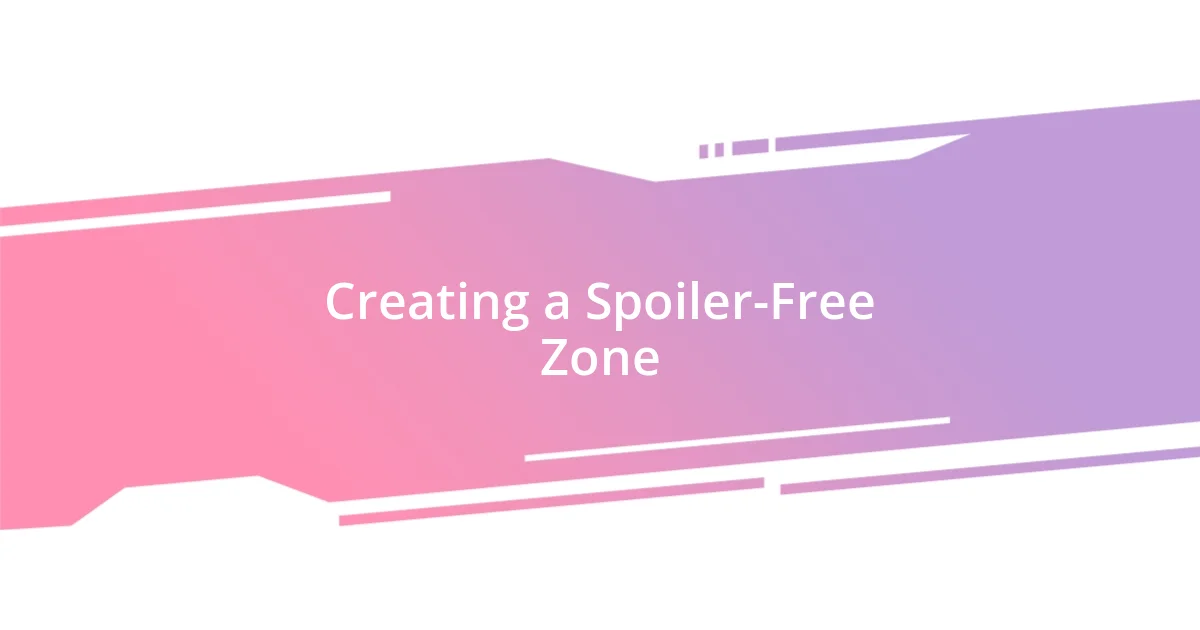
Creating a Spoiler-Free Zone
Creating a spoiler-free zone requires a blend of communication and strategy. I remember a time when I was at a friend’s game night, and someone started discussing a recent plot twist from a show I hadn’t watched. In that moment, I felt the tension rising—I didn’t want to seem rude, but protecting my enjoyment was a priority. So, I took a deep breath and gently interjected, suggesting we keep the conversation to games instead. It felt challenging at first, but it also felt empowering to establish that boundary.
To effectively create that protective bubble, I recommend establishing clear guidelines with your group. For instance, I once suggested a “no spoilers” rule before attending a movie premiere with friends. Surprisingly, everyone was on board, and we created a pact to respect each other’s excitement. It turned our anticipation into a shared experience, almost like a secret game we were all excited to play. Have you ever been part of a group that agreed to protect each other’s eagerness?
Maintaining a spoiler-free zone isn’t just about direct conversations; it’s also about the environment we cultivate. I’ve found that setting aside certain spaces—like my living room or a café—where spoiler talk is off-limits encourages a deeper connection during discussions. Recently, I hosted a gathering where we shared our favorite series, but only talked about past episodes. It shifted the focus from what to expect to what we loved, creating an atmosphere that buzzed with enthusiasm rather than anxiety. How do you think a spoiler-free setting can change the way we engage with stories?
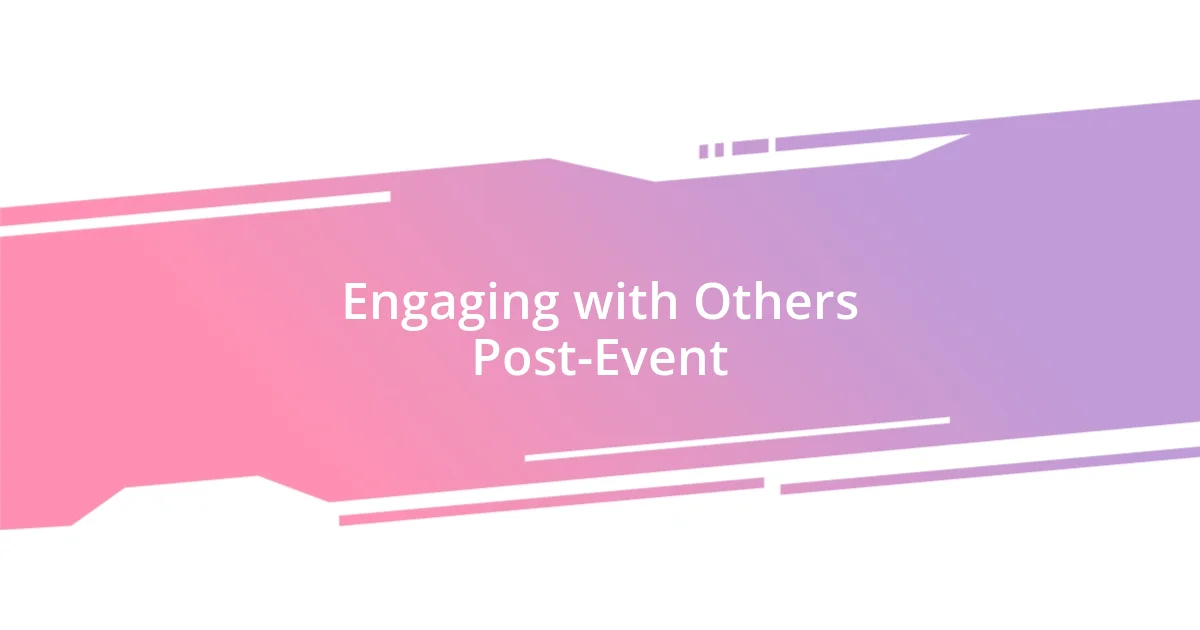
Engaging with Others Post-Event
It’s fascinating how engaging with others post-event can turn a simple experience into a memorable conversation. After attending a highly anticipated movie, I found myself in a lively discussion with friends, each of us eager to share our thoughts while carefully sidestepping any spoiler territory. Honestly, it felt exhilarating to dissect our individual interpretations—each perspective added layers to the film I hadn’t considered. Have you ever left an event and realized that your conversations can enhance your understanding of the experience?
During these post-event chats, I’ve learned the importance of asking open-ended questions. Once, after a fan convention, I asked fellow attendees what surprised them the most about specific panels. Their answers opened up a flood of insights and opinions that transformed the experience into something even richer. It’s incredible how a simple question can invite deeper reflection and create a shared sense of discovery. How do you perceive the power of questions in conversations?
Often, I find that discussing our emotions about an event can create a strong bond. After a recent book launch, I felt compelled to share how deeply the story resonated with me. I wasn’t the only one; as we exchanged our emotional reactions, it felt like I was reveling in a community of like-minded souls. These moments of vulnerability forge connections that often linger long after the event. Have you felt that rush of camaraderie when sharing heartfelt experiences with others?
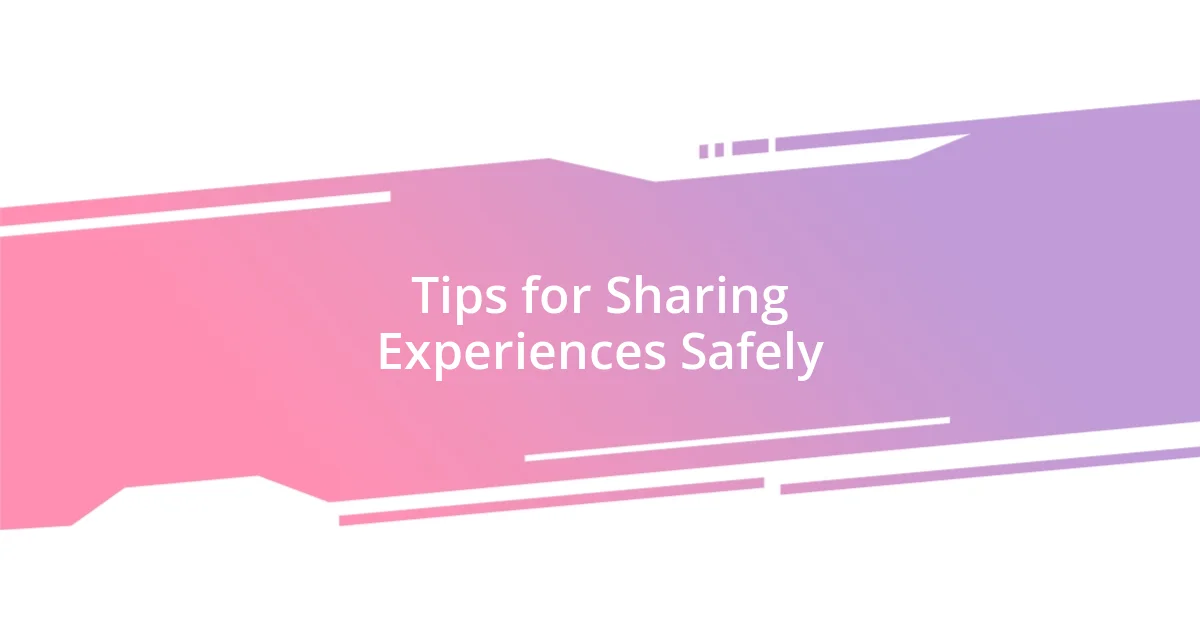
Tips for Sharing Experiences Safely
When it comes to sharing experiences safely, one of the most effective strategies I’ve used is to set expectations before an event. For example, I remember attending a comic book convention with friends. Before we even stepped foot through the doors, we agreed to a subtle signal: if someone started to veer into spoiler territory, we’d just raise our hands like we were time-outing a kid. This light-hearted approach kept the atmosphere playful and helped us all remain mindful of each other’s enjoyment. Have you ever tried a similar tactic with friends?
Another tip that has worked well for me is using social media cautiously. After attending a thrilling game release event, I was excited to share my experience with others online. Before posting, I paused and thought about how my words might affect those who hadn’t played yet. Instead of revealing plot points, I focused on my excitement and favorite moments without giving too much away. This intentionality in sharing helped me connect with others without risking their enjoyment. Have you ever second-guessed a post for the sake of someone else’s experience?
Lastly, I find that creating a safe space for dialogue, whether in person or online, can really enhance how we share our experiences. Once, after binge-watching a new series, I invited a few friends over for a casual discussion. We set a timer, ensuring that for the first half, we only talked about episodes we’d all seen. That mutual respect allowed everyone to feel included, and it transformed the evening into one filled with laughter and thoughtful exchange rather than accidental spoilers. How does it feel when you know everyone around you is on the same page?
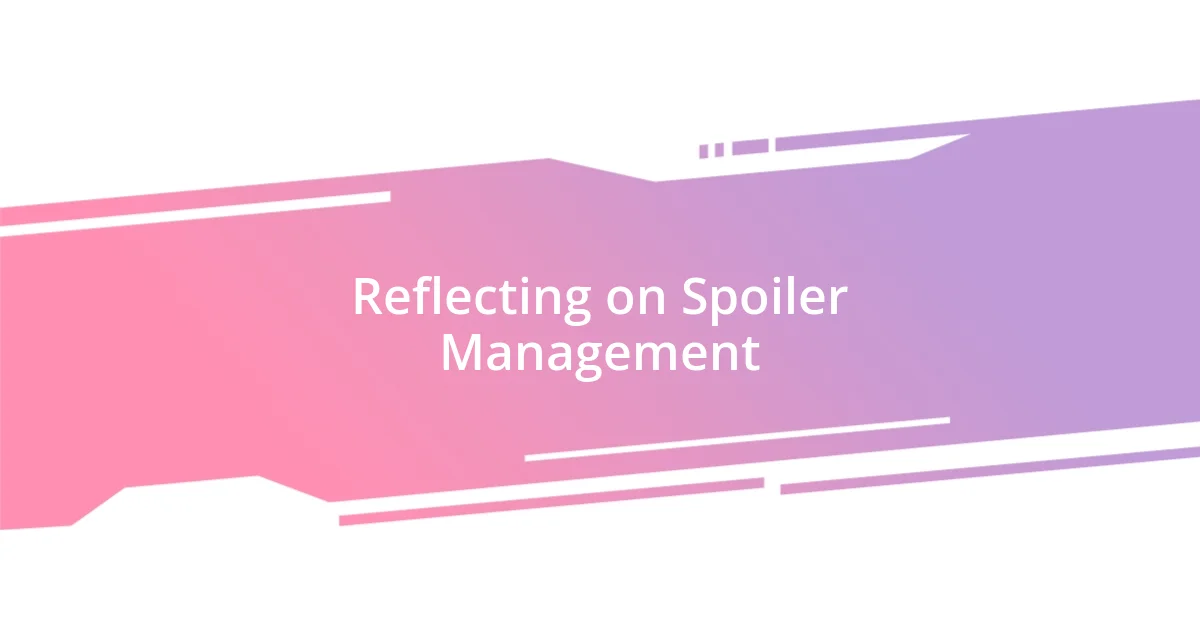
Reflecting on Spoiler Management
Reflecting on how I managed spoilers at events has been quite an enlightening journey. I once attended a major film premiere, and before the screening, I decided to keep my excitement in check by focusing on the atmosphere rather than the content. It was thrilling to absorb the energy of fellow fans without inadvertently spoiling the experience for myself or them. Have you ever noticed that sometimes anticipation can build just as much excitement as the event itself?
Another impactful moment was watching how others navigated spoiler territory. During a book festival, I saw a friend share a poignant quote from a novel during a discussion. Instead of revealing key plot elements, she offered just enough insight to draw everyone in. This technique not only piqued my interest but also created a space where curiosity thrived without spoiling. How do you choose your words when talking about something others might not have experienced yet?
I’ve come to believe that spoiler management is also about respecting boundaries. At a recent comic con, I encountered someone who hadn’t read a popular series. I felt the urge to chatter about my favorite twists, but instead, I asked them what aspects they were looking forward to. That simple pivot led to a lovely discussion about themes and character arcs without crossing into spoiler territory. Isn’t it fascinating how a small shift in focus can transform the conversation?










